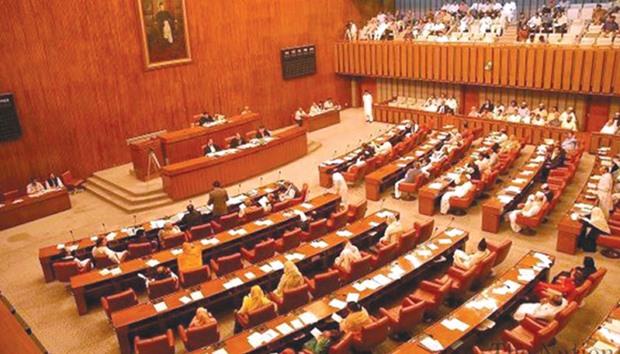Pakistan’s Senate yesterday passed an amendment to the country’s constitution that allows military courts for terrorism suspects to operate for another two years.
The 28th Amendment Bill 2017, which seeks the extension of military courts for another two years, was passed in the Senate on Tuesday after two-third majority votes came in its favour.
According to the vote count, 78 votes came in favour of the bill while three opposed it. The bill will become an Act of Parliament after the President’s signature.
After the bill becomes an act, the duration of the military courts will be extended for another two years, starting from January 7, 2017.
All the parties, except for the government ally PkMAP supported the bill. The JUI-F, opted to abstain from voting.
The bill, which was moved on March 10 by Law Minister Zahid Hamid, demands implementation of the law of evidence during the proceedings. It also asks for suspects to be brought to court within 24 hours and be entitled to have a lawyer of their choice.
Before the Senate session, Hamid had confirmed that the bill will be approved during yesterday’s session.
He added, “This amendment would have been approved six days earlier had all members of different parties taken the matter seriously.”
Earlier on March 10, the Senate passed the Pakistan Army (Amendment) Bill 2017 but postponed voting on the 28th Amendment Bill 2017 to March 28.
The Army Act 2017 further amends the Pakistan Army Act 1952. In January 2015 the Pakistan Army Act 2015, along with the 21st Constitution amendment, was passed to try hardcore terrorists in military courts.
Four additions have been made in the previously passed Pakistan Army Act 2015.
Maulana Attaur Rehman of JUI-F opposed the bill, saying “terrorism should not be linked with any religion, group or sect”. His objection was rejected by a majority of the Senate.
Taking part in the discussion, Sardar Azam Khan Musakhel opposed the bill and said that by extending military courts, democratic parties were empowering dictatorship in the country.
Sitara Ayaz said that Khyber-Pakhtunkhwa was the worst hit by terrorism and that is why her party was going to support this bill to end the scourge from the country.
The 28th Amendment has already been passed by the National Assembly when 255 NA members voted in favour while only four voted against the bill on March 21.
Rights activists are concerned that a parallel judicial system will undermine civil liberties.
Critics of the military courts argue the government needs to reform the entire judicial system and implement the National Action plan in letter and spirit.
The military tribunals were set up for a two-year term in January 2015 after Taliban gunmen stormed a school in north-western Pakistan, killing nearly 150 students.
After the two-year term expired in January this year, political groups had been unable to agree on an extension. But a surge in attacks across Pakistan, in which around 130 people were killed in recent weeks, forced opponents of army tribunals to reconsider.
Pakistan’s lower house, the National Assembly, passed the bill on March 21.
Similar to last time, the legislation includes a two-year sunset clause from the date of enactment.
Rights activists said giving more powers to the military, which has ruled the country for almost half its existence, would undermine the rule of law.
During their first two-year term, 11 military courts across the country sentenced 161 militants to death, the military said in January.

78 votes came in favour of the bill while three opposed it.
